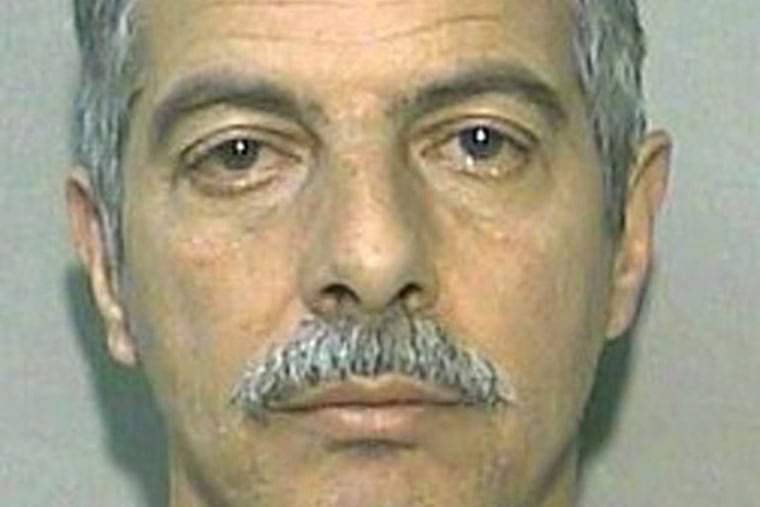Alleged mob underboss gets almost 16 years
Joseph "Mousie" Massimino, the loquacious mobster described as the underboss of Philadelphia's organized-crime family, was sentenced Thursday to nearly 16 years in prison by a judge skeptical he would ever abandon a life of crime.

Joseph "Mousie" Massimino, the loquacious mobster described as the underboss of Philadelphia's organized-crime family, was sentenced Thursday to nearly 16 years in prison by a judge skeptical he would ever abandon a life of crime.
"I can only conclude, Mr. Massimino, that you don't get it, that you never have gotten it," said U.S. District Judge Eduardo Robreno.
The 188-month term was not as bad as it could have been for Massimino, 63, the most prominent defendant convicted in a racketeering trial of Philadelphia's mob leaders. Prosecutors wanted a 20-year term, and the judge cut him a break by not classifying him as a career offender, a designation that could have added years to his sentence.
Still, it was too much for Massimino. In a 10-minute rant, he challenged the conviction, vilified prosecutors, ridiculed the law, and dismissed as "a joke" claims he was a mob leader.
"I'm no boss of nothing, you know what I mean?" he told the judge.
Massimino insisted that La Cosa Nostra was "a thing of the past" and that he barely knew some of his codefendants or witnesses, like the debtor who testified that he appealed to Massimino to keep a lower-ranking loan shark at bay.
He argued that if the government had devoted as much time and resources to disrupting al-Qaeda as it did to the mob, "the World Trade Center would still be there, and maybe those poor people in Boston would still have their legs and arms."
The outburst came near the end of a two-hour hearing that drew government lawyers, FBI agents, and about two dozen of Massimino's friends and relatives, some who could not restrain their contempt.
"All bums," one muttered as Assistant U.S. Attorney Frank Labor recounted for the judge the trial witnesses against Massimino. "A disgrace," another said as Robreno outlined the punishment.
Massimino was the first of four defendants the judge was set to sentence over the next week. His lawyer, Joseph Santiguida, argued that Massimino did not deserve more than six years, or about what fellow mobsters Martin Angelina and Gaeton Lucibello got last year after pleading guilty to the racketeering conspiracy charge.
But Massimino's conviction was the highlight in an otherwise mixed verdict for prosecutors in their first major mob trial in a decade. One defendant, alleged captain Joseph "Scoops" Licata, was acquitted, and jurors determined dozens of other counts to be not guilty or undetermined.
Reputed boss Joseph "Uncle Joe" Ligambi and his nephew, alleged captain George Borgesi, await a retrial after jurors deadlocked on the racketeering charge against them.
The panel also hung on three counts of illegal gambling against Massimino, but convicted him of conspiracy - concluding that he belonged to the mob, an organization whose purpose was crime and whose means was violence.
According to trial testimony, Massimino ran Lou's Crab Bar at 11th Street and Moyamensing Avenue in South Philadelphia. The tavern was a hangout for mobsters and became the base from which Massimino held meetings, summoned underlings, and oversaw daily business as Ligambi's second-in-command.
In arguing for the maximum term, Labor said Massimino had never shown an inclination to be a law-abiding citizen, starting with his expulsion in the 1960s from St. John Neumann High School in South Philadelphia.
But by joining the mob, he said, Massimino progressed from just a "mediocre" criminal to a successful, and probably wealthy, one. In four decades, he racked up 21 arrests and six felony convictions on charges ranging from methamphetamine trafficking to hindering prosecution.
According to Labor, Massimino never had a legitimate job and never would. "It is more likely," he told the judge, "that the Tooth Fairy walks through that door than this defendant will be rehabilitated."
Massimino didn't help his cause with his diatribe Thursday, when he stood at the defense table and flailed his arms as he sought to make his points.
He blamed the expanded use of the racketeering statute - and prosecutors' ability to pile on at sentencing - for unusually long sentences and an explosion of federal prisons. He said he was being punished for exercising his right to go to trial, unfairly getting 15 years for a crime that would have netted him only 63 months if he admitted it.
By the end, Massimino seemed resigned - or aware that he might have gone too far. Gathering his papers, he dialed down his tone and looked at Robreno. "What it is, it is, Judge," he said. "I'll go with whatever you say."
The judge called Massimino "a well-spoken and intelligent and capable businessman," and paused to wonder what might have been. But he said Massimino's "defiant" remarks reinforced the notion that the mobster had no remorse or regrets.
With time off for good behavior and credit for the time he has served, he could be free in about 11 years.